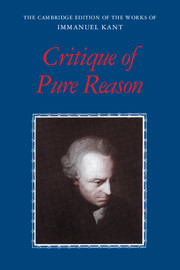Book contents
- Frontmatter
- Contents
- General editors' preface
- Acknowledgments
- Introduction
- Immanuel Kant, Critique of Pure Reason
- I Transcendental doctrine of elements
- Division one. Transcendental analytic
- Book I Analytic of concepts
- Book II Analytic of principles
- Appendix: On the amphiboly of concepts of reflection
- Remark to the amphiboly of concepts of reflection
- Division two. Transcendental dialectic
- II Transcendental doctrine of method
- Editorial Notes
- Glossary
- Index
Appendix: On the amphiboly of concepts of reflection
from I - Transcendental doctrine of elements
Published online by Cambridge University Press: 05 July 2013
- Frontmatter
- Contents
- General editors' preface
- Acknowledgments
- Introduction
- Immanuel Kant, Critique of Pure Reason
- I Transcendental doctrine of elements
- Division one. Transcendental analytic
- Book I Analytic of concepts
- Book II Analytic of principles
- Appendix: On the amphiboly of concepts of reflection
- Remark to the amphiboly of concepts of reflection
- Division two. Transcendental dialectic
- II Transcendental doctrine of method
- Editorial Notes
- Glossary
- Index
Summary
Reflection (reflexio) does not have to do with objects themselves, in order to acquire concepts directly from them, but is rather the state of mind in which we first prepare ourselves to find out the subjective conditions under which we can arrive at concepts.97 It is the consciousness of the relation d of given representations to our various sources of cognition, through which alone their relation among themselves can be correctly determined. The first question prior to all further treatment of our representation is this: In which cognitive faculty do they belong together? Is it the understanding or is it the senses before which they are connected or compared? Many a judgment is accepted out of habit, or connected through inclination: but since no reflection preceded or at least critically succeeded it, it counts as one that has received its origin in the understanding. Not all judgments require an investigation, i.e., attention to the grounds of truth; for if they are immediately certain, e.g., between two points there can be only one straight line, then no further mark of truth can be given for them than what they themselves express. But all judgments, indeed all comparisons, require a reflection, i.e., a distinction of the cognitive power to which the given concepts belong.
- Type
- Chapter
- Information
- Critique of Pure Reason , pp. 366 - 370Publisher: Cambridge University PressPrint publication year: 1998



